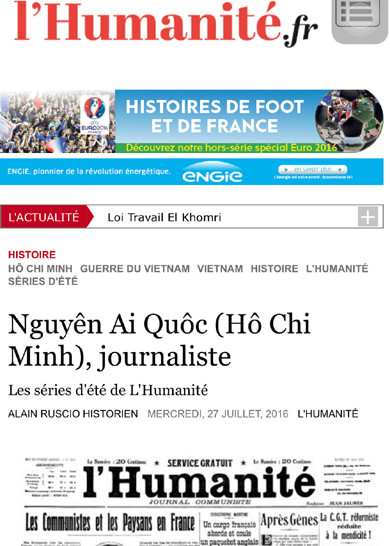The summer column of France’s "L'Humanité" newspaper recently published an article "Journalist Nguyen Ai Quoc (Ho Chi Minh)" by Alain Ruscio, a French historian specializing in the Indochina War.
The article occupies a page of the newspaper, talking about patriot Nguyen Ai Quoc’s activities in France, in the period of 1918-1923. He was not only an editor-in-chief of the newspaper "Le Paria" but also much attached to the newspaper "L'Humanite". The article is illustrated with photos of Nguyen Ai Quoc presenting his speech at the Tours Congress in December 1920 and the article Nguyen Ai Quoc published in the "L'Humanité" newspaper on May 25 th , 1922.
According to the article, the name Nguyen Ai Quoc drew interest from readers of “L'Humanité” newspaper and many French people when they knew he is Ho Chi Minh, the name of the Vietnamese Leader, as appeared since 1942.
 |
| In the period of 1918-1923, Nguyen Ai Quoc lived in France. His full profile confirmed that this is a crucial period in his awareness and political orientation, the prelude to a rare life of passionate revolutionary activities. According to the European criteria, at first in France, Nguyen Ai Quoc’s political understanding was not high. However, the young man clearly identified what he wanted, that is: liberation of the country. And aware of the limitations of the nationalist movement, Nguyen Ai Quoc found a new way for this aspiration. |
During that time, Nguyen Ai Quoc frequented political forums and debate clubs. At the end of 1918, Nguyen Ai Quoc joined the French Socialist Party, and thereby became one of the first people from a colonial country directly enrolling France’s political life. Meanwhile, Nguyen Ai Quoc was only interested in one thing: who was concerned about the fate of his nation? Who stood up to protect his people?
In December 1920, in Tours, Nguyen Ai Quoc and the majority voted to establish a new political party. A famous photo showed that he, with modesty, was presenting. Besides him, you may recognize a familiar silhouette of Paul Vaillant - Couturier. It is no coincidence that the two leaders of international communism in the future were side by side then.
Portrait of journalist Nguyen Ai Quoc and his ideals are better portrayed by the author at the second part of the article.
According to the author, from 1920 until he left France in the summer of 1923, Nguyen Ai Quoc launched a major operation. He was a founding member of the Alliance of Colonial Nations and he launched a newspaper with a significant name "Le Paria" (Pariah), gathering colonial people across France. But, since then, the newspaper "L'Humanité" was a place Nguyen Ai Quoc represented his press writing talent with about 20 articles in just over a year. The majority of these articles referred to Indochina with lofty international spirit. Nguyen Ai Quoc also depicted the poverty and misery of black people in Africa, and the situation of workers' movements in Turkey.
For Nguyen Ai Quoc, the communist press must be both organizer and educators.
As the organizer, communist press must emphasize mutual complementariness in the struggle of French workers and workers from colonial countries. He ended each article with a call to action.
As the educator, members of the new party (communist), like many others, knew nothing about the colonial situation.
In the "L'Humanité" newspaper on May 25 th , 1922, a year and a half after the Tours Congress, Nguyen Ai Quoc implicitly criticized the passivity of the new movement when he wrote: "The French Party (communist) can’t, like first and second International, satisfy themselves with demonstrations with pure sentiment and lack of continuity, but must have an authentic action plan and a specific and effective policy."
The article stated two reasons for the weakness: The first was by the largeness and distance of colonial nations; the second (and the main reason) is the "indifference of the metropolitan working class to the colonies" and "prejudices" about the weakness of the colonial residents, while warning that "imperialism and capitalism will not miss opportunity to exploit the mutual suspicion to prevent communications and divide forces which need to unite together”.
Nguyen Ai Quoc’s thoughts are still topical in France when stepping into the 21st century.
With an objective perspective and vivid illustrations, the article of Historian Alain Ruscio on the "L'Humanité" newspaper helped us better understand Nguyen Ai Quoc, a journalist, a revolutionist, in the years of 1918-1923 in France./.
BTA